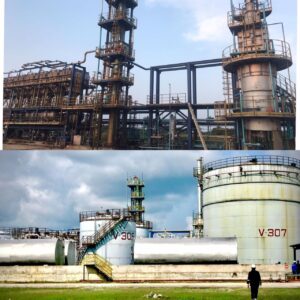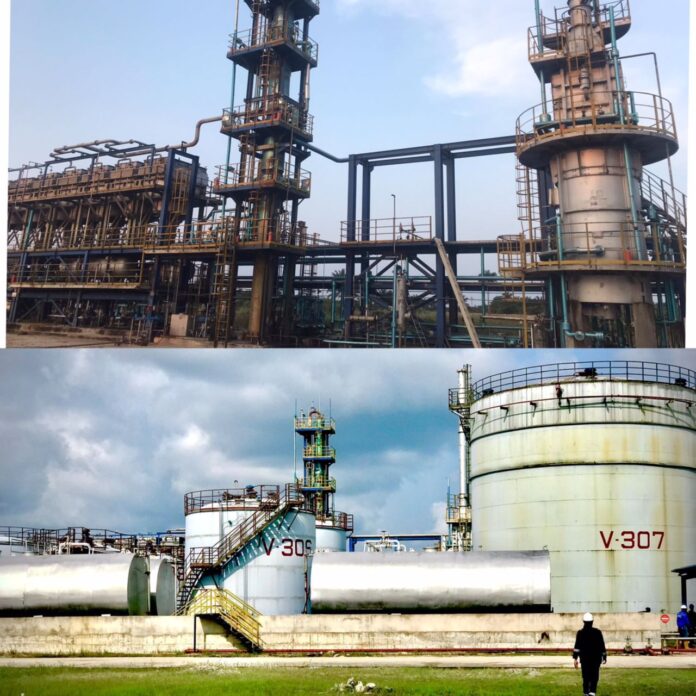The management of AIPCC Energy Limited, operators of the Edo Refinery and Petrochemicals Company Limited (ERPCL), has raised concerns over the persistent lack of crude oil supply despite being a fully operational refinery with a capacity of 1,000 barrels per day.
Despite a directive from President Bola Tinubu and the disclosure by the Dangote Refinery regarding the Nigerian National Petroleum Company Limited’s (NNPCL) refusal to supply crude oil, the Edo Refinery has yet to receive any allocation from the relevant authorities.
Speaking to journalists in Benin City over the weekend, Segun Okeni, speaking on behalf of the Edo Refinery, detailed the significant challenges the refinery faces due to the ongoing shortage of crude oil. The refinery, which requires a daily supply of 1,000 barrels, has been unable to operate at its full capacity.
Okeni explained that although the company secured crude oil supply agreements with Seplat and ND Western in 2022, bureaucratic hurdles have prevented the refinery from accessing the necessary resources. He cited a letter sent in 2021 to Mele Kyari, the Group Chief Executive Officer of NNPCL, which went unanswered despite numerous meetings and ongoing communication.
“In August 2021, our team, led by our chairman, met with the NNPCL CEO and top management to discuss our intention to purchase crude oil. We followed up with a formal request on July 22, 2024,” Okeni said.
He further noted that NNPCL representatives visited the refinery for a site inspection in July 2022, and by September, commercial negotiations had taken place. Despite these efforts, no progress has been made.
Okeni highlighted other key issues, including the failure of NNPCL to assign any of the preferred oil fields for crude allocation to the Edo Refinery, despite engagements since August 2021. Even with options to source crude from ND Western, First Hydrocarbon, and Seplat, the refinery has yet to receive any supply.
He also mentioned that ERPCL has a Crude Oil Supply Agreement with ND Western to lift crude from the Ughelli Pumping Station (UPS), owned by NNPC Exploration and Production Limited (NEPL) and operated by Shoreline. However, despite several meetings and readiness to make necessary modifications for offtake, no progress has been made.
As a way forward, ERPCL urged NNPCL and other producers to establish the necessary loading infrastructure to facilitate crude supply to smaller refineries. Okeni expressed concern that while Dangote Refinery is allocated 30,000 barrels per day due to its public profile, smaller refineries are overlooked, stifling their potential contribution to the economy.

Okeni called on Mele Kyari, the Group CEO of NNPC, to intervene and ensure that the Seplat-ERPCL agreement is honored, enabling the Edo Refinery to commence crude oil lifting from the designated Oil Mining License (OML).
Reflecting on the past two years, Okeni described the experience as frustrating, particularly for local investors. He questioned how Nigeria could attract foreign investment if even local investors struggle to secure crude oil.
Okeni pointed out that the total daily demand of all modular refineries is less than 2% of Nigeria’s daily crude oil production and argued that facilitating their operations would reduce pipeline losses.
He further explained that loading from NNPCL’s pumping station would be cost-effective, as it would eliminate pipeline export terminal charges and losses, making modular refineries more competitive than offshore counterparts.
Okeni warned that the lack of crude oil supply could deter further investment in the modular refinery sector, citing the example of OPAC Refinery, which operates at less than 3% of its installed capacity, and Edo Refinery at less than 10%.
He emphasized that Nigeria is losing millions of dollars due to NNPCL’s failure to supply modular refineries over the past three years, with a total installed capacity of less than 30,000 barrels per day.




